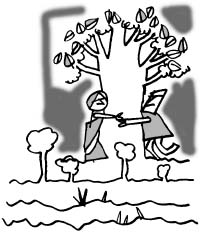
 |
CHIPKO: A case study in CIVIL DISOBEDIENCE Ryan Redmond |
|
I. Go to the following website. This website features loads of spectacular interviews with people who live in mountain regions in many parts of the world, including the Indian states of Himachal Pradesh and Uttaranchal. (The Chipko movement began in the neighboring state of Uttar Pradesh, but has since spread to these, and other, regions.) A number of the interviewees, in addition to providing a vast wealth of information about life in these regions, speak specifically about the Chipko movement. Directions a. At the main page, click on the "India" button in the upper right hand corner. b. You will now be at a page which includes an introduction to the region and a list of searchable themes in a column along the left hand side. c. Click on any number of themes, perhaps most applicable would be "forestry," "development," and "community activities." d. At the bottom of the page, you'll see a list of "key testimonies," or interviews, which feature the chosen theme. e. Pick three different testimonies to read through. These are lengthy, feature questions and responses on all manner of topics and will take a good amount of time to read carefully. (Some of the interviewees refer specifically to the Chipko movement. In addition to being useful, for this obvious reason, the interviews will also act as guides in terms of subject matter and format.) II. Writing an interview. Drawing upon what you now know about the Chipko movement and about life in the Indian Himalaya, as described in the interviews, gathered from 1993 to 1999, write a three page interview. Imagine that you are a journalist working for a major American newspaper: the Los Angeles Times or the Boston Globe perhaps. It is the mid 1970's. You have been hearing about the Chipko movement and you have gone to Uttar Pradesh to cover the story. You are interviewing a village woman about her involvement in the movement and her day to day life. Expectations a. Your interview will follow the format of the testimonies found on Mountain Voices. b. Your interview will be three pages in length. c. You will address, at least, the following topics: dayily life, roadbuilding, the role of women in the movement, the whys, whats and wheres of the movement, the necessity and usefulness of forests, community, nonviolent action and development.
|
This site was created by Ryan Redmond at the NEH Summer Institute "Cultures and Religions of the Himalayan Region," held at the College of the Holy Cross, Summer 2006